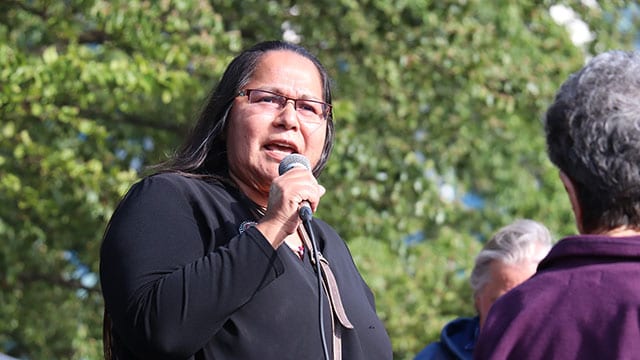
Chief Judy Wilson speaks at No Buyout, No Kinder Morgan' rally in downtown Vancouver May 29, 2018. (Credit: Julia-Simone Rutgers/The Discourse)
(Chief Judy Wilson speaks at No Buyout, No Kinder Morgan’ rally in downtown Vancouver May 29, 2018. Credit: Julia-Simone Rutgers/The Discourse)
Indigenous leaders and grassroots people on the front lines against the Trans Mountain pipeline expansion are vowing to continue the fight against the fossil fuel project, regardless of the outcomes of two events slated for Thursday that could determine the pipeline’s fate.
One day ahead of both a scheduled federal court decision related to the government’s duty to consult and a Kinder Morgan shareholder vote to finalize the sale of the pipeline to Canada, the Union of B.C. Indian Chiefs (UBCIC) released a statement vowing that, “no matter who owns this pipeline and tanker project, it will be stopped.”
Grand Chief and UBCIC President Stewart Philip also said that “Kinder Morgan executives recognized Justin Trudeau’s desperation to placate the oil lobby and are exiting the project with massive profits on the backs of Canadian taxpayers.”
Shareholders of the Texas oil giant are expected to vote in favour of the pipeline’s $4.5 billion sale to Canada.
Earlier this month it was revealed that Kinder Morgan, in documents filed with the United States Security and Exchange Commission, has projected the pipeline could cost $1.9 billion more than their original estimates.
Thursday’s shareholder vote comes on the same day—a scheduled 30 minutes later, in fact—as Canada’s Federal Court of Appeal releases its decision on a case involving almost two dozen lawsuits challenging the National Energy Board’s review of the project.
First Nations involved in the lawsuit say Canada did not adequately consult with them.
Some members of the Tsleil-Waututh Nation, one of the nations involved in the case, are currently standing their ground in Burnaby, where they’ve constructed a traditional watch house outside the Trans Mountain Burnaby Marine Terminal grounds where the pipeline expansion would carry diluted bitumen from the Alberta oil sands to be shipped out of Canada.
In July Tsleil-Waututh youth activist Cedar George-Parker told APTN that even if the federal court rules against the First Nations, he and others will continue to defend unceded Coast Salish territory.
“There is no backing down,” he said.
“We’ll do whatever it takes. It’s embedded in us. It’s who we are.”
Jim Leyden, the Tsleil-Waututh Watch House Camp Elder, said if efforts are made to build infrastructure through where the camp is located to the terminal “we may have to occupy [the watch house] to make sure they can’t hook up the pipelines.”
“We’re standing on the enemy’s tail here,” he said.
George-Parker vowed to “put my life on the line,” he said, “because this is more than just me.
“I have brothers and sisters. I have nieces and nephews. That’s who I’m fighting for. I have my ancestors behind me, and I have all of the next generation after me. So it’s my duty…to fight right now.”
Neskonlith First Nation Chief Judy Wilson, who is secretary-treasurer of the UBCIC, said in Wednesday’s statement that “land defenders and water protectors along the pipeline route have launched frontline resistance to the tar sands project,” and that in Secwepemc territory, “which comprises more than half the total pipeline route, the Tiny House Warriors are building structures along the construction path.
“We will not back down, no matter how the stockholders vote tomorrow,” she said.
Kinder Morgan and Canada have argued that more than 40 First Nations of the roughly 133 who stand to be impacted by the pipeline have have signed agreements with the corporation.
In Secwepemcul’ecw, four of 17 bands created by Canada under the Indian Act have agreements, though members of the Secwepemc Women’s Warrior Society, the Tiny House Warriors and the Secwepemcul’ecw Assembly all maintain that developing on Secwepemc land requires the consent of all Secwepemc people, not just those identified by Canada.
Earlier this year an economist working with the Indigenous Network on Economies and Trade (INET) sounded the alarm on risks associated with Trans Mountain that he said neither the federal government nor Kinder Morgan were publicly acknowledging or taking seriously.
D.T. Cochrane said from an economic standpoint the greatest uncertainty around Trans Mountain’s future “stems from the Indigenous jurisdiction that exists.”
He said Canada’s purchase of the pipeline is a “perfect example of the socialization of risk,” meaning instead of private investors bearing the burden of a risky investment, Canadians now stand to lose billions if the project is stopped on the grounds it would violate Indigenous rights, or if Indigenous people and allies stop the project through mass protest.
“The Trans Mountain pipeline and tanker project does not have the consent of all affected First Nations, and Trudeau cannot force this project through without Indigenous consent,” UBCIC Vice-President Bob Chamberlin said in Wednesday’s news release.
“With Canada as owner, we need to see a major scale up in transparency, accountability and oversight for the project if the courts don’t compel an outright cancellation.”










